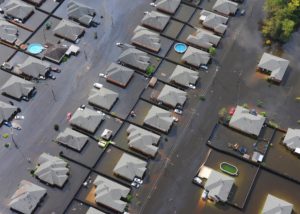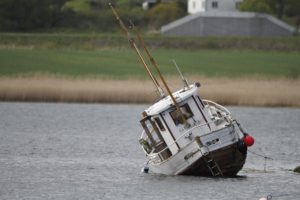After the Hurricane: Navigating the Adjustment Process
By: J. Dirk Schwenk
 Not surprisingly, we are receiving a lot of calls about boats lost in Hurricane Irma and the other disasters of 2017. The number of boats lost to sinking, flooding and high winds in the Carribean and South Florida is extreme. For boat owners (and property owners) that are trying to deal with the adjustment of their claims with the insurance companies, here are some of the things you should be considering.
Not surprisingly, we are receiving a lot of calls about boats lost in Hurricane Irma and the other disasters of 2017. The number of boats lost to sinking, flooding and high winds in the Carribean and South Florida is extreme. For boat owners (and property owners) that are trying to deal with the adjustment of their claims with the insurance companies, here are some of the things you should be considering.
1. Facts, Photographs and Documents are the key. Far and away the most important thing that adjusters need to get you paid is evidence of what you lost. If the boat is on land and still contains your personal effects, that proof is likely to come down to just questions that can be answered by survey or inspection of the boat itself. If the boat is sunk or lost, you will need to provide evidence of what was aboard — photographs, receipts, etc. – whatever you can put your hands on in addition to proof of the value of the boat. If you can reach your boat, it is almost always worthwhile to inspect it yourself so you can be sure that the surveyor on scene (who has to look at hundreds and hundreds of claims) has reasonably captured the damage.
2. Start a File and a Timeline. Unless things go perfectly, you will need to keep track of who you talk to, who you sent things to, etc. Start a file. You should also track the timeline of events. You will need to follow up, so use the timeline to set times to do that before too much time passes. If there were conversations or events before the storm that may effect coverage, make a timeline of those events, including notes on any discussions that may matter in the future.
 3. Insurance Policies and Coverage Exclusions. All marine insurance carries with it an obligation for an insured (you) to use utmost good faith in submitting an application for insurance. All policies will also have a number of specific exclusions which may range from certain kinds of maintenance to the requirement that the boat be hauled during hurricane season or be brought North during hurricane season. If you have a claim, it is highly recommended that you read your insurance policy focusing on the exclusions to coverage, and see if there is a likely exclusion that may be applied to your claim. If so, you may need to consult with counsel or other professionals concerning how best to assure that coverage is available.
3. Insurance Policies and Coverage Exclusions. All marine insurance carries with it an obligation for an insured (you) to use utmost good faith in submitting an application for insurance. All policies will also have a number of specific exclusions which may range from certain kinds of maintenance to the requirement that the boat be hauled during hurricane season or be brought North during hurricane season. If you have a claim, it is highly recommended that you read your insurance policy focusing on the exclusions to coverage, and see if there is a likely exclusion that may be applied to your claim. If so, you may need to consult with counsel or other professionals concerning how best to assure that coverage is available.
4. Identify Team Members. For a major claim, particularly a disputed claim, there are number of people that may be needed to achieve success. A competent, respected surveyor that does not also work for your insurance company is very valuable. It is wise to identify an attorney to discuss the policy and to be sure that any reports on the loss are both accurate and unlikely to trigger a policy exclusion. Your attorney will need to see both our policy and any report of claim you have made, at minimum. Finally, a person who can be boots on the ground at the boat and at the yard to track repairs and make sure that the boat is secure while it awaits repairs is very valuable.
J. Dirk Schwenk is a Maryland lawyer in Real Estate law, Waterfront Property, Civil Litigation and Maritime Law from Annapolis, Maryland. He graduated cum laude (with honors) from the University of Maryland School of Law in 1997 and has been in private practice in Maryland ever since.